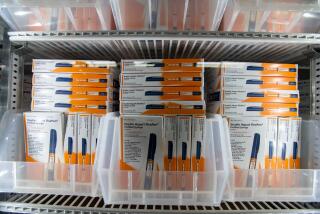High court rules ‘pay-for-delay’ drug deals can face antitrust suits
- Share via
WASHINGTON — A brand-name drug maker can be sued for violating antitrust laws if it agrees to pay a potential competitor to delay selling a generic version, the Supreme Court ruled.
The 5-3 decision is expected to result in lower prescription drug prices for consumers, advocates said. The Federal Trade Commission, which has pursued suits against the drug makers, estimated that the so-called pay-for-delay deals cost consumers and health plans $3.5 billion a year.
The ruling sends a warning to drug makers that try to deter generic rivals from entering the market by settling potential patent claims, paying the competitors to stay out of the market for years more. That enables the brand-name drugs to continue being sold exclusively at higher prices.
A “large and unjustified” payment to settle a patent dispute can trigger an antitrust claim against the brand-maker, the court said.
The court, however, did not rule that all such deals violated antitrust laws. Instead, it said regulators will have to win on a case-by-case basis, and it sent the FTC’s case against specialty pharmaceutical firm Actavis Inc. back to the lower court for trial.
Many consumer advocates hailed the court’s ruling, but some said that it didn’t go far enough and that lawmakers needed to take action.
“While we’re disappointed the court did not take the next step and outlaw this anti-competitive practice, we expect Congress to now give this issue the attention it deserves and end these deals once and for all,” said Austin Price, field director for the California Public Interest Research Group.
AARP, the lobbying arm for seniors, also decried the pay-for-delay settlements as anti-competitive.
“Making sure prescription drugs are available and affordable for consumers is critical to our nation’s healthcare system,” said Joyce Rogers, AARP’s senior vice president for government affairs.
Some lawmakers on both sides of the aisle also praised the decision, which they said could spur pending legislation.
“The Supreme Court’s opinion confirms what we have been saying all along — that pay-for-delay deals are anti-consumer, anti-competitive and are in contrast to antitrust law,” said Sens. Amy Klobuchar (D-Minn.) and Charles E. Grassley (R-Iowa), who recently introduced legislation to crack down on such settlements.
David Balto, an antitrust lawyer and former FTC policy director, said, “No other decision this term will have as much impact on consumer’s pocketbooks.
“It clearly maps out how the FTC can use the law to stop these anti-competitive schemes and make sure consumers receive the full benefits of a competitive marketplace,” Balto added.
Industry officials found a silver lining in the decision, saying they were pleased that the court didn’t view patent agreements as presumptively unlawful, as the FTC urged.
But they predicted that the uncertainty going forward will lead to more legal disputes and delays for patients.
That uncertainty “will make it less likely that innovator pharmaceutical and generic companies will be able to settle these disputes in the future,” said Mit Spears, general counsel of the Pharmaceutical Research and Manufacturers of America.
Spears said litigating the cases on an individual basis also is going to result in substantial costs to both brand-name and generic drug makers.
Although generic drug makers recognized the added costs of litigation, they were pleased with the court’s decision to let the lower courts handle the issues on a case-by-case basis.
“This preserves all options for generic manufacturers to bring lower-cost generic medicines to patients as soon as possible,” said Ralph G. Neas, president of the Generic Pharmaceutical Assn.
For the court, the case posed a conflict between the patent laws, which give patent holders a monopoly, and antitrust laws that forbid monopolistic practices and anti-competitive deals.
Drug patents can last for 20 years, but sometimes the patents are questionable. For example, a drug company may obtain a new patent for 20 more years by slightly changing the formula for a drug or how it is administered to a patient. In these instances, a generic competitor may sue, seeking a ruling that the extended patent is invalid.
Often these suits end in a settlement in which the brand-name drug maker agrees to pay its rival to delay selling a generic for several years. Such deals benefit the brand-name maker with continued high profits, and they send money to the generic maker. Consumers, however, pay the cost through higher prices.
In Monday’s opinion by Justice Stephen G. Breyer, the high court announced a middle-ground position.
It rejected the view of most lower courts that drug makers can never be sued for an antitrust violation so long as they are defending a valid patent whose 20-year life has not expired.
At the same time, the justices did not rule these pay-for-delay deals are usually illegal under the antitrust laws, as the FTC had argued.
Breyer said a “large and unjustified reverse payment” from a brand-name maker to a generic maker can trigger an antitrust suit. But the outcome in each case will depend on the facts. A judge will have to decide whether the payment was a reasonable way to end a lawsuit or an unjustified bid to ward off competition, he said.
Justices Anthony M. Kennedy, Ruth Bader Ginsburg, Sonia Sotomayor and Elena Kagan joined with Breyer.
Chief Justice John G. Roberts Jr. dissented and said the court’s “novel approach” will prevent companies from settling disputes. “I would keep things as they were,” he said, “and not subject basic questions of patent law to an unbounded inquiry under antitrust law.”
Justices Antonin Scalia and Clarence Thomas joined his dissent, while Justice Samuel A. Alito Jr. took no part in the decision.
Times staff writer Chad Terhune contributed to this report.
More to Read
Inside the business of entertainment
The Wide Shot brings you news, analysis and insights on everything from streaming wars to production — and what it all means for the future.
You may occasionally receive promotional content from the Los Angeles Times.











